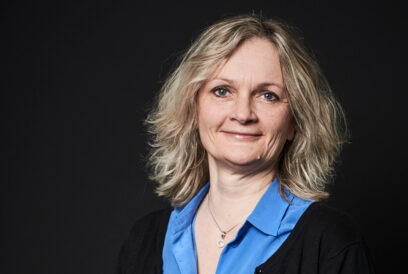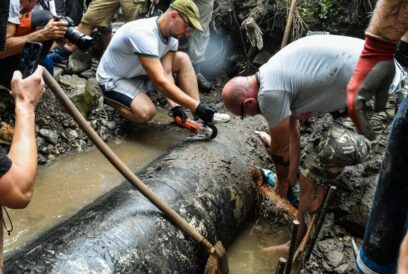

Out of isolation and into the community -the goal of adult education of vulnerable citizens. / Photo: Börkur Sigurbjörnsson
Out of isolation and into the community -the goal of adult education of vulnerable citizens. / Photo: Börkur Sigurbjörnsson
Active citizens, participation, social activities! This vision of active citizenship is impossible for some groups of people. Vulnerable learners may lack basic skills to be able to participate. For adult education to help solve this problem, current studies point to the need to balance the individual and the environmental processes of inclusion and to balance its emotional and functional aspects.
In current society there seems to be a tendency that a citizen has to be active and join more and more social activities in order to find a suitable place in society. Several countries embrace the term “participative society” in order to stimulate citizens to become active.
Although this seems to be a strong vision, active citizenship seems not to be possible for everyone. Due to social circumstances, missed opportunities in education or other environmental or social issues people can become vulnerable. For example, adults facing low skills in literacy or in basic skills (literacy, numeracy, technology) can experience barriers in order to become an active citizen.
This means that active citizenship can not only be seen as realising new projects in your neighbourhood or being active in political movements and supporting others, but also as simply being able to join contemporary society in the first place.
Beneficial impact of adult education
In nine out of ten countries all over the world knowledge of the impact of adult education has increased. Besides, more than half of the countries agree on the fact that adult education can have an effect on employability. Adult learners seem to get a better place in society after joining courses of adult education, both formal and non-formal. In other words adult education can be a lever in increasing the rate of social inclusion among vulnerable citizens. For example, vulnerable learners gain better language skills, seem to be more active in their near surroundings, are less isolated and seem to be more assertive (De Greef et al., 2012).
Likewise, adult learners gain more self-confidence, experience personal growth and have better contact with others. As a side effect for some of them, their current status on the labor market will be improved after joining a course of adult education. For example one is more active in searching a job, some learners found a job and others became active as a volunteer. Finally, adult learners seem to experience a better physical and psychological health and the rate of depression seems to decrease
To sum up, after joining courses of adult education, adult learners become more socially included and active in society. But what does this mean for these learners?
To help understand the details of the process of how learning furthers active citizenship and inclusion, we present a two-perspective framework that illustrates the balance between the individual and the environmental processes of inclusion and the balance between emotional and functional processes of inclusion. Such a holistic understanding of the motivations of active citizenship can be helpful for adult education professionals to continue playing a role in activating vulnerable people.
Social inclusion as an interpretation of active citizenship
In order to describe social inclusion as an outcome of education, two perspectives have to be taken into account (De Greef et al., 2012).
The first perspective or process of inclusion refers to the balance between the importance of the individual and the social environment (family, neighbors, colleagues, etcetera) and the second perspective refers to the balance between emotionality and functionality.
First perspective: Individual-Social
First, our behaviour is determined through the interaction between our individual needs and the changing social environment. On one hand the environment can be a determining factor in behavioural change. On the other hand, the individual is capable of making his or her own choices and determine his or her own future-plans.
Second perspective: Emotional -Functional
Secondly, vulnerable people can join adult education programs motivated by different factors. They may want to increase contacts with others to cope with loneliness (emotional perspective) or, for example, to increase their knowledge about using the internet (functional perspective). In this context social inclusion can be seen as encountering functional problems (like reading letters) and social problems (like contacting neighbours) in daily life.
Figure 1 shows the combination of the aforementioned two perspectives on social inclusion. As a result, four processes of social inclusion can be distinguished, namely: (a) activation, (b) internalization (being more satisfied with yourself and feeling safer), (c) participation and (d) connection.

In this context, activation and participation can be seen as processes to increase functional knowledge, skills and attitudes to encounter problems in daily life. An example of activation is organising and reading your mail (on an individual level) and of participation is visiting the doctor (in contact with the environment). On the other hand, internalization and connection are processes describing the increase of emotional rewards with, on the one hand being e.g. more assertive (on an individual level) and, on the other hand gaining more personal contacts (in contact with the environment).
A holistic approach
Political decision makers and society as such must realise that promoting active citizenship also means promoting basic skills and social inclusion. Adult education has a long experience in this field and it has the potential to be an important lever in making also vulnerable people active citizens in the different domains of life.
To play that role in the future, adult education itself needs to include the two perspectives in order to increase active citizenship. This includes an understanding of the balance between the importance of the individual and the environment and the balance between emotionality and functionality – and finding ways to implement that understanding in the learning activities of basic skills aiming increase social inclusion among adult learners.
References
Bandura, A. (2001). Social cognitive theory. Annual Review of Psychology, (52). In J. W. Santrock (2008). Life-span development. New York: McGraw-Hill, 46 – 47.
Bandura, A. (2004). Toward a psychology of human agency. Paper presented at the meeting of the American Psychological Society, Chicago. In J. W. Santrock (2008). Life-span development. New York: McGraw-Hill, 46 – 47.
Bandura, A. (2006). Going global with socio cognitive theory: From prospect to paydirt. In S. I. Donaldson, D. E. Berger & K. Pezdek (Eds.), The rise of applied psychology: New frontiers ad rewarding careers. Mahwah, NJ: Erlbaum. In J. W. Santrock (2008). Life-span development. New York: McGraw-Hill, 46 – 47.
Berkman, N.D., DeWalt, D.A., Pignone, M.P., Sheridan, S.L., Lohr, K.N., Lux, L., Sutton, S.F., Swinson, T. & Bonito, A.J. (2004). Literacy and Health Outcomes. Rockville, MD: Agency for Healthcare Research and Quality.
De Greef, M., Segers, M., Nijhuis, J. & Lam, J.F. (2014). Impact onderzoek taaltrajecten Taal voor het Leven door Stichting Lezen & Schrijven op het gebied van sociale inclusie en leesvaardigheid Deel A. Maastricht: Maastricht University.
De Greef, M., Segers, M. & Verté, D. (2012). Understanding the effects of training programs for vulnerable adults on social inclusion as part of continuing education. Studies in Continuing Education. DOI: 10.1080/0158037X.2012.664126.
De Greef, M., Verté, D. & Segers, M. (2012). Evaluation of the outcome of lifelong learning programmes for social inclusion: a phenomenographic research. International Journal of Lifelong Education. DOI: 10.1080/02601370.2012.663808.
Endler, N., S. & Magnusson, D. (1976). Toward an interactional psychology of personality. Psychological Bulletin, 83, 956 – 974.
Krueger, R. F., South, S., Johnson, W. Iacono, W. (2008). The heritability of personality is not always 50%: Gene-environment interactions and correlations between personality and parenting. Journal of Personality, 76, 1485 – 1522.
Lupi, C. De Greef, M., Segers, M. & Verté, D. (2011). Does Adult Education Make a Difference? Maastricht: EDAM.
Markus, H. & Nurius, P. (1986). Possible selves. American Psychologist, 41, 954 – 969. In S. Krauss Whitbourne (2005). Adult development & aging: Biopsychological perspectives. Hoboken: John Wiley & Sons, Inc., 259.
Nye M. & Hargreaves, T. (2009). Exploring the Social Dynamics of Proenvironmental Behavior Change: A Comparative Study of Intervention Processes at Home and Work. Journal of Industrial Ecology, vol. 14 (1), 137.
UNESCO Institute for Lifelong Learning. (2016). 3rd Global Report on Adult Learning and Education: The Impact of Adult Learning and Education on Health and Well-Being; Employment and the Labour Market; and Social, Civic and Community Life. Hamburg: UNESCO Institute for Lifelong Learning.





